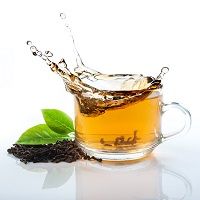Girl Lands in the ER with Hepatitis from Too Much Green Tea
Green tea has been linked to what seems like an endless list of health benefits. From weight loss to protection against cardiovascular disease to even treatment for bladder disease, steeping a cup seems like a proactive thing to do. But one 16-year-old girl's green tea consumption landed her in the hospital.

Green tea has been linked to what seems like an endless list of health benefits. From weight loss to protection against cardiovascular disease to even treatment for bladder disease, steeping a cup seems like a proactive thing to do. But one 16-year-old girl’s green tea consumption landed her in the hospital.
The rare occurrence began in Yemen when the patient went to her general practitioner with nausea, joint pain, and general abdominal pains. It was believed that she had a urinary tract infection (UTI), and therefore, was prescribed amoxicillin. Two doses into the prescription, the patient went to the emergency room with worsening symptoms. This is when she was diagnosed with jaundice and an acute medical team took over. With no personal or family medical history, a negative pregnancy test, no recent travel, and denying use of alcohol or any kind of drugs, the patient seemed to be healthy before the hospital visit. Other notable observations include a temperature of just over 99 °F, blood pressure of 124/78 mm Hg, and 98 bpm.
A second round of questions involving the patient’s history revealed that she had been consuming three cups of Chinese green tea every day for the past three months. She ordered the green tea on the Internet for weight loss purpose, according to the report in BMJ Case Reports.
“Herbal and dietary supplements are a known cause of hepatotoxicity, but patients often tend to neglect reporting their use and therefore a potential etiology goes unrecognized by physicians,” the report said.
The patient indeed had jaundice, but other laboratory tests turned up negative for autoimmune disease as well as hepatitis A, B, and C. Ultrasounds confirmed normal liver, gallbladder, spleen, and kidney size and function. However, highly elevated alanine transaminase with normal alkaline phosphatase was reported and anti-smooth muscle antibody was weakly positive.
So what was going on here? After ruling out viral hepatitis and autoimmune hepatitis, the diagnosis could be pinpointed as acute hepatitis caused by Camellia sinensis in the green tea.
The patient stopped drinking the green tea and with intravenous fluid treatment, the hepatitis went away completely. She was discharged from the hospital and two months later she had normal liver function.
This case of acute hepatitis was, luckily, reversible. However, this isn’t the first time that too much tea has sent a patient to go to the hospital. Earlier this year, a physician alerted that a man suffered from kidney failure because he drank too much black tea.
This may confirm that there in fact can be too much of a good thing.